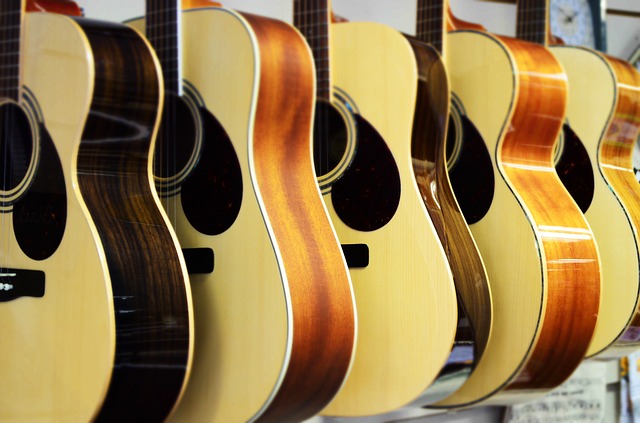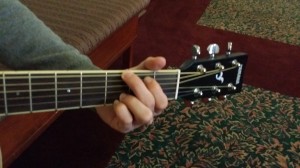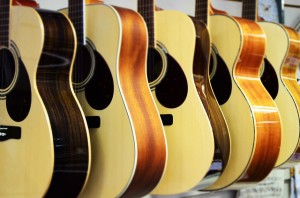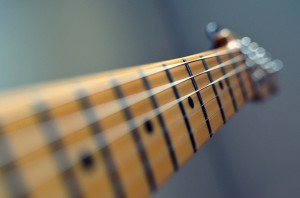
A guitar is one of the world’s most popular instruments.
But learning to play takes more than just a little practice. The Scoop talked with two guitar instructors — Clint Harrison of The Studio and Rock Norat — for some tips for beginners eager to try the instrument.
More than 40 years of teaching experience has allowed Harrison to figure out the most common problems among guitar beginners. He says even though it is hard to play the guitar well initially, it is important for students to enjoy the experience. “Some people just play the guitar with no fun, and that is no good,” he says.
Norat has been teaching guitar for more than 10 years. He says it is important to develop a sense of rhythm and emphasizes the importance of practice. “I used to say students that if they practice four hours, then they are A students,” he says. “When they practice three hours, they are B students.”
The two instructors offered these tips for neophytes wanting to become better:
1. Build finger strength
Work to increase finger strength. Strong fingers make a clear sound, Norat says.
The guitar makes the sound when the strings are pressed, and strong fingers are required to press the strings firmly. Harrison also says it is important to increase the finger strength to use the fret board accurately.
2. Learn to read music first
“Some people start to learn the guitar with chords, and I think it is backward,” Harrison says. He thinks it is more important for guitar beginners to learn to read music. That way, students can understand music and the theory behind it. Learning individual notes also helps musicians understand chords, and often, beginners are not ready to begin playing chords.
“I start with the music note because since students are not ready to play the chord, it will just make them frustrated,” Harrison says.
3. Find common fingers and common shape
Beginners must place their fingers in the right position to make the clear sound. However, it is often hard for beginners to move fingers smoothly from one chord to another. For these people, they need to find a common finger and a common shape.
“Between the chord that you are coming from and the chord that you are going to, there are fingers that stay on the same string and on the same fret board,” Harrison says. “This is the common finger.”
Because beginners are not familiar with chords, whenever they play a new chord, they start everything new each time. This is not a good strategy. Instead, leave the common fingers on the fret board. And notice how some chords have the same hand position and shape when they are played.
“A lot of people won’t recognize there is a common shape between two chords,” Harrison says. “You need to find it and keep it. Do not let it go and start the new chord.”
4. Develop a sense of rhythm
Norat says that getting a sense of rhythm will also help to move fingers from one chord to another easily by letting players to know when chords will be changed. When players understand the rhythm of the song, then they will understand the song’s timing, which will help them to prepare to move fingers.
“If you have the recording of the music that you want to play, listen to it,” he says.
5. Be patient
“Some people just try to take it too soon even though they are not quite ready yet,” Harrison says.
Harrison says that there are three phases for learning how to play the guitar:
- Learn to make sounds by pressing the strings.
- Learn to change the chords and make them to flow.
- Learn to quickly change chords on the fret board.
It is critical to learn in the proper order, Harrison says.
“Over and over and over, people try to play the chords before their fingers are strong enough and before they increase their hand strength,” he says. There are proper times to learn something new, so beginners should be patient until they are ready to go on to the next step.
6. Practice, practice, practice
“It takes a lot of practice to play the guitar well,” Norat says. As with any musicial instrument, players should practice to improve their skills.
The key is consistent practice, Harrison says. “Let’s say you are practicing 30 minutes a day. That is a total of 3 hours and 30 minutes in a week,” he says. “This consistency from day to day is important, and this is what develops the hand strength.”





I’ve just started to play guitar not long ago and I agree that patience and practice are very important for skill improvement. I greatly appreciate the post, very helpful. Cheers!
Hey thanks soo much this really helps! Im a 15 year old girl and an intermediate guitar player but not too long ago a beginner, and i think as well my beginner guitar is holding me back from doing alot. I was wondering if there are any cheaper guitar brands with still a nice quality that you can get with expensive guitars because i have like no money. Also, do you have any recommendations on new amps or any posts about that?im also getting quite sick of my amp which is an ibanez with almost no nobs to mess around with, and my instructor says my amp is holding me back as well.